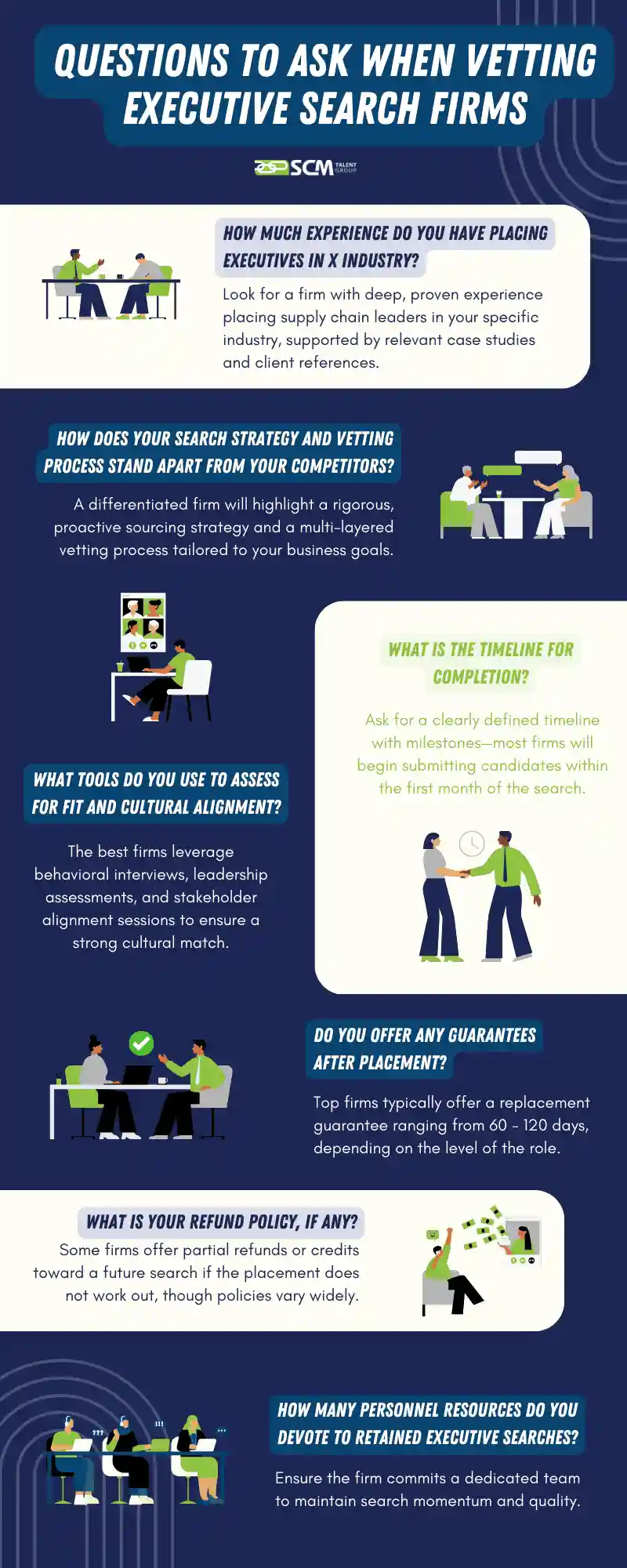
How to Select a Supply Chain Executive Search Firm – 7 Key Factors for Hiring Leaders
Introduction
Knowing how to select an executive search firm can future-proof your company for years to come. Conversely, trusting a firm that’s not specialized or experienced enough can create costly delays in the hiring process – and set your company back months, if not years. This guide will provide readers with a search process to use with best practices to use with an executive search partner. Knowing what questions to ask and how to vet firms can save you money while landing you the best and most talented leader for your organization.
Specialized Executive Roles Offer Unique Challenges to Employers
All executive hiring can be challenging. However, the more niche and nuanced an industry or role, the more difficult it is to find the perfect leader. That creates more variables when searching. It’s already going to be difficult enough to maintain production while also trying to attract the right proactive candidates. The right firms allow you to continue operations while they use their networks and relationships to find active and passive candidates.
An example of a highly specialized search would be hiring within the supply chain disciplines. Supply chain involves a lot of different functions and crosses almost every industry. From food and beverage to aerospace and defense, and most everything in between. While you can find a generalist recruiter to hire a Vice President of Sales for a car maker, you may struggle to hire a firm that specializes in finding top-tier talent in transportation and logistics.
It’s very important to outline your specific needs and goals before starting your search process. This will help you answer questions like boutique or large? retained or contingent? Specialized or Generalist?
Who better to trust than those who have worked in the field? Your function-specific Director or VP should be able to talk shop with your hiring partner when it comes to executive search. This position could make or break your firm, so your needs and desires need to be fundamentally understood by the team you’re trusting with your future.
TIP: Try and test your potential search firm by having a C-Suite representative on an intake call to discuss the position and industry in detail. If the firm you’re vetting can’t talk the talk, they may not be a good fit for you.

Key Factors to Consider When Selecting an Executive Search Firm
The what, when, why, how, and how much are just some of the things that need to be considered when selecting an executive search partner.
What is the firm’s specialty? Do you hire a plumber to work on your car? Probably best to hire a search firm that specializes in your verticals. This proven experience is necessary when choosing leaders for your organization.
When did the firm start recruiting executives? This gets to the network and relationships that help them tap into hard-to-reach talent markets.
How does the firm conduct its searches? Search methodology and process are very important. The tools, assessments, interview tactics, and ability to properly vet future leaders for your company are key differentiators in firms.
A lot of the most successful recruiters have worked in the field in which they’re recruiting and understand how it works. While you may be able to get by hiring lower-level roles with non-specialized recruiters, it would be unwise to trust such a consequential hire to people who aren’t experts.
How can they demonstrate their network and candidate reach? It’s all about who you know. Former industry-specific professionals who migrate to recruiting have better access to specialized talent. They know where to look first and maintain relationships with thought leaders and industry professionals to not only reach the talent first but also pre-vet candidates in a more thorough manner. Passive talent – or candidates who aren’t actively looking for a new role – are easier for specialized recruiters to find due to their vast networks and deep relationships in the field.
Case Studies and Testimonials
Can the agency you’re vetting prove their work? Client testimonials are essential for building trust with your talent management partner. These provide third-party validation as well as the views of your industry peers – and maybe even competitors. Pressing your recruiter for some case studies is also a good idea. You want them to show you that they’ve successfully filled similar roles in your industry.
Types of Executive Search Firms
When determining how to select an executive search partner, it’s important to try and do a little research so you can target your recruiting strategy. If your hiring needs are mid-level professionals who don’t have a high degree of specialization, you’ll likely be working with an agency that hires on contingency. This means the fees you’ll be charged will be paid once the candidate is placed.
However, executive search almost exclusively operates on a retained search model. This is ideal for critical, confidential senior roles. You will be working with more seasoned recruiters who likely have a specialization in the field in which you’re trying to hire. You will also have a team devoted to the search with a high level of interaction and regular communication. The retained process is a lot more thorough and requires more time and expertise on behalf of the recruiter. So you pay for what you get. Retained searches typically involve a series of payments to the agency, paid upon varying benchmarks.
The size of the firm matters as well. If you’re looking to hire domestically in a highly specialized, niche field, you might be best to work with a boutique firm. They have higher touch and more specialization, typically. They work hand in glove with clients with a higher level of service. Larger firms have more resources and can operate more effectively internationally. Both boutique and large firms serve an important purpose. You just have to be the one to decide which one best suits your hiring needs.
Questions to ask when vetting Executive Search Firms
Why the Right Firm Matters Now More Than Ever
In today’s fast‑evolving business environment, executive search is undergoing a profound transformation. Where traditional approaches once concentrated on filling vacancies, modern search firms are now strategic partners, guiding organizations through market shifts, talent scarcity, and leadership complexity. One significant trend is the increased reliance on boutique, industry‑specialized search firms, particularly for highly technical or niche roles. These specialized recruiters combine deep domain expertise with established networks, enabling them to source passive candidates—those not actively seeking change—who might otherwise remain off the market (en.wikipedia.org).
Another major shift is the integration of advanced assessment technologies—from AI‑powered candidate matching and psychometric profiling to immersive leadership simulations. These tools augment human judgment, offering predictive insights on cultural fit, adaptability, and performance potential. By blending quantitative rigor with qualitative nuance, firms create more holistic and reliable candidate evaluations. This not only accelerates search cycles but significantly reduces risk—critical in roles like Chief Supply Chain Officer or VP of Procurement, where the consequences of a poor hire can be profound.
Increasingly, organizations prioritize diversity, equity, and inclusion (DEI) in leadership hiring, and forward‑thinking search firms are rising to meet that demand. Firms like Stanton Chase, affiliated with the Association of Executive Search Consultants (AESC), have formalized commitments, overseeing pledge programs like the White House Equal Pay Pledge and partnering with gender balance initiatives such as the 30% Club (en.wikipedia.org). These affiliations ensure candidate slates include underrepresented groups while also embedding accountability and transparency throughout the process.
Additionally, globalization has spawned a spike in cross‑border placements, particularly for roles with strategic operations spanning continents. Large, international firms like Spencer Stuart—operating in over 70 offices across 33 countries—bring a blend of global reach and local market expertise that few internal HR teams can replicate (en.wikipedia.org).
So why should organizations engage these firms in 2025?
- Access to hidden talent pools: Executive firms tap latent markets—identifying and engaging passive candidates who are not accessible via job boards.
- Speed and precision: Their proprietary pipelines, vetting methodologies, and search discipline typically reduce time-to-hire from months to weeks, saving both time and opportunity cost.
- Confidentiality: Especially for sensitive leadership transitions or board‑level replacements, retained search firms ensure discretion that internal recruiters cannot.
- Strategic market insight: Beyond filling seats, they offer value through market benchmarking, compensation trends, competitive intelligence, and succession planning.
- Accountability and guarantees: Many firms operate with performance‑based fee structures, offering replacement guarantees within 60–120 days that safeguard your investment (en.wikipedia.org, scmtalent.com).
In an era marked by digital disruption, geopolitical uncertainty, and shifting consumer expectations, leadership demands a fine blend of agility, vision, and technical acumen. Talent professionals have adapted in turn, becoming indispensable co‑pilots in C‑suite talent strategy. Organizations that embrace this partnership gain a competitive edge, ensuring that each leadership hire is not just qualified, but transformative.
Conclusion
Knowing how to select an executive search firm can position your organization with leaders for many years to come. The opposite is also true. Not only can choosing the wrong talent agency prove costly, but it could also delay growth plans and wreak havoc on annual budgets and production goals. Securing leadership that aligns with your organization’s mission, culture, and long-term objectives should be left to people who do it for a living. The key is preparing for this hire before engaging with an agency. By clearly defining your needs, understanding the difference between firm types, and asking thoughtful, targeted questions, you’ll be better equipped to identify a search partner that can add immediate value to your company. Whether you’re hiring for a highly specialized role or a broad executive function, the right search firm should act as an extension of your leadership team. They should be able to offer deep expertise, trusted networks, and a commitment to finding the best possible fit for your role from an execution view and a cultural fit and alignment. Executing in a thoughtful and calculated manner will pay off with the acquisition of leadership and stability of your organization for many years to come.